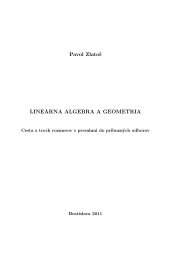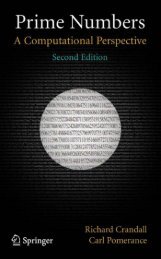COMPUTATIONAL PROBLEMS IN ABSTRACT ALGEBRA.
COMPUTATIONAL PROBLEMS IN ABSTRACT ALGEBRA.
COMPUTATIONAL PROBLEMS IN ABSTRACT ALGEBRA.
You also want an ePaper? Increase the reach of your titles
YUMPU automatically turns print PDFs into web optimized ePapers that Google loves.
X Preface<br />
I am indebted to the authors for their co-operation in producing this<br />
volume, to Dr. Howlett for contributing the Foreword, to the S.R.C.<br />
Atlas Computer Laboratory for a Research Fellowship during the tenure<br />
of which much of the work of editing was done, and to the University of<br />
Glasgow for leave of absence both to attend the Conference and to accept<br />
the Research Fellowship. It is also a pleasure to acknowledge the co-operation<br />
of the publishers, Pergamon Press, and it is through no fault of theirs<br />
that events such as the devaluation of British currency (which necessitated<br />
a change of printers) have conspired to delay the appearance of this volume.<br />
JOHN LEECH<br />
Investigations of groups on computers<br />
J . NEUB~~SER<br />
1. Introduction. In this paper a survey is given of methods used in and<br />
results obtained by programmes for the investigation of groups. Although<br />
the bibliographies [De l] and [Sa 1,2,3] have been used, among other<br />
sources, no claim for completeness can be made for two reasons, that<br />
some publications may have been overlooked, and that the conference<br />
itself has shown once more that there are many activities in this field which<br />
are not (yet) covered by regular publications.<br />
1.1. Papers and programmes have not been included if their main objective<br />
is something different from the study of groups, even if groups play<br />
some role in them. Four particular cases of this kind may be mentioned.<br />
1.1.1. Combinatorial problems dealing with things like generation of<br />
permutations, graphs, orthogonal latin squares, projective planes, block<br />
designs, difference sets, and Hadamard matrices. For most of these topics<br />
surveys are available, e.g. [Ha 1,4; SW 11.<br />
13.2. Theorem-proving programmes. Most of these have been used to<br />
construct proofs for very elementary group-theoretical theorems. There<br />
seems to be only one mo l] specifically made to handle group-theoretical<br />
statements.<br />
1.1.3. Programmes for the determination and study of homology and<br />
homotopy groups, where the main interest is in the topological relevance<br />
of the results. Such papers are [Li 4; Ma 1, 2; Pi l] and part of [Ca 23.<br />
1.1.4. Applications of groups in fields like coding theory [Pe l] or the<br />
use of a computation in residue class groups for the improvement of a<br />
programme described in pa 11.<br />
1.2. Although the distinction is not always quite clear cut, it is practical<br />
for this survey to distinguish between special purpose and general purpose<br />
programmes. In spite of the fact that the first category is more likely to<br />
produce significant contributions to group theory, more space will be<br />
given in this report to the second kind, simply because this is the author’s<br />
own field of work.<br />
2. Special purpose programmes. By the first kind I mean programmes<br />
specially made for the investigation of a particular problem; when this<br />
1




